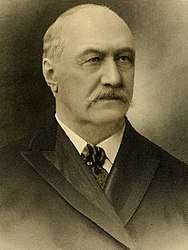Samuel W. Allerton
Samuel Waters Allerton was a businessman who made hundreds of millions of dollars primarily in stockyards and livestock.
Samuel Waters Allerton | |
|---|---|
 | |
| Born | May 26, 1828 |
| Died | February 22, 1914 (aged 85) |
| Occupation | Businessman |
| Political party | Republican |
Allerton was the Republican Party's nominee for Chicago mayor in 1893, losing to Democratic nominee Carter Harrison Sr.
Early life
Allerton was born May 26, 1828 in Amenia, New York.[1][2]
Allerton was the son of Samuel Waters Allerton, Sr., a tailor and wool mill operator, and his wife Hannah Allerton née Hurd.[2] He was the youngest of nine children.[1][2][3]
Allerton was a decendent of Mayflower pilgrim Isaac Allerton.[3]
When Allerton was seven, amid his father had financially failed his family, and the family property was being auctioned off.[1] This was reported to be a formative experience in Allerton's life.[1] At the age of twelve, Allerton entered the workforce.[1] The family experienced further financial diffuclty as a result of the Panic of 1837.[2] The family moved several times, including as far west as Dubuque, Iowa, but ultimately settled on an upstate New York farm in 1942.[2]
Adult life and career
Allerton rented and purchased farms, netting profits from them, and became a small-time livestock trader.[1][2] He built up his involvement in livestock.[1] He additionally made money in a venture transporting livestock over land when a break occurred in the rail line between Erie, Pennsylvania and Dunkirk, New York.[1]
Allerton then moved west, ending up in Illinois where he again raised cattle.[1] He moved his cattle operations to Chicago in 1860, opening up Allerton Swine Yards at the terminus of the Hudson River Railroad.[4]
On July 1, 1860, Allerton wed Pamilla W. Thompson of Peoria, Illinois.[1] She was the daughter of a wealthy cattle farmer.[4][5]
In 1863, Allerton and his wife Pamela had a daughter named Kate Renett Allerton.[5]
In 1864, Allerton was a key partner in the founding of the Pittsburgh Joint Stock Yards.[4]
Allerton was a leader in the push to consolidate Chicago's railroad stockyards into the Union Stock Yards.[3][4]
Allerton was a co-founder of the First National Bank of Chicago.[4][5][6]
Allerton led a group that invested $1 million to construct the St. Louis National Stockyards.[3] Allerton also invested in stockyards located in Baltimore, Jersey City, St. Joseph, Missouri, and Omaha.[3]
In 1873, Allerton and his wife Pamela had their second child, a son named Robert Allerton.[4][5]
Allerton was widowed in 1880 after Pamilla died of scarlet fever.[1][4][5] After this, he married Agnes C. Thompson, his first wife Pamilla's sister, on March 15, 1882.[1][4][5] Agnes was 24 at the time of their wedding, whilst Allerton was 53.[5] While he and Agnes never had any children of their own, Agnes was particularly motherly to Allerton's young son Robert, who was both her stepson and nephew.[5]
In 1893 he was the Republican nominee for mayor of Chicago.
Allerton died on February 22, 1914.[2]
Wealth and property
By the turn of the twentieth century, Allerton was among Chicago's wealthiest men.[5] At one point, Allerton was ranked by the Chicago Tribune as the third-wealthiest man in Chicago, behind only Marshall Field and J. Ogden Armour.[4]
Allerton was a regular presence on Chicago's society pages.[5]
Allerton owned a private Pullman railcar.[4]
Allerton had a residence on Chicago's prestigious Prairie Avenue.[5] He also maintained homes in Lake Geneva and Pasadena.[5]
Allerton owned stockyards and farms throughout the Midwestern United States.[5]
References
- Allerton, Walter Scott; Currier, Horace True (1900). A History of the Allerton Family in the United States: 1585 to 1885, and a Genealogy of the Descendants of Isaac Allerton, "Mayflower Pilgrim," Plymouth, Mass., 1620. Higginson Book Company. pp. 83–89.
- Tischauser, Leslie V. "Allerton, Samuel Waters (1828-1914), meat packer". American National Biography. doi:10.1093/anb/9780198606697.001.0001/anb-9780198606697-e-1000023#anb-9780198606697-e-1000023. Retrieved 11 May 2020.
- Pate, J'Nell L. (2005). "America's Historic Stockyards: Livestock Hotels". TCU Press. pp. 71, 72, 76. Retrieved 26 May 2020.
- Fleeson, Lucinda (2009). Waking Up in Eden: In Pursuit of an Impassioned Life on an Imperiled Island. Algonquin Books. pp. 195–196. ISBN 978-1-56512-944-3. Retrieved 27 May 2020.
- Syrett, Nicholas L. (3 January 2012). "Queering Couplehood: Robert & John Allerton and Historical Perspectives on Kinship". Genders 1998-2013. University of Colorado Boulder. Retrieved 27 May 2020.
- Freeman, Huey (17 December 2013). "Tours to give rare insight into Illinois socialite's life". Herald-Review.com. Herald & Review. Retrieved 29 May 2020.